A new era of intelligent scheduling and organizing has emerged in the dynamic field of productivity and time management with the integration of artificial intelligence with calendar and planner software. The "Best 10 AI Planner & Calendar Software You Can Use Right Now" are examined in this blog, which dives into state-of-the-art programs that use AI to improve scheduling, task management, and general productivity.
These systems are the epitome of AI-driven efficiency, offering everything from smooth interaction with other apps to adaptive learning algorithms and easy time-blocking. Take a tour through the capabilities of these ten best tools, each with special characteristics to improve teamwork, help you prioritize your work, and help you adjust to the always-shifting demands of contemporary life and work.
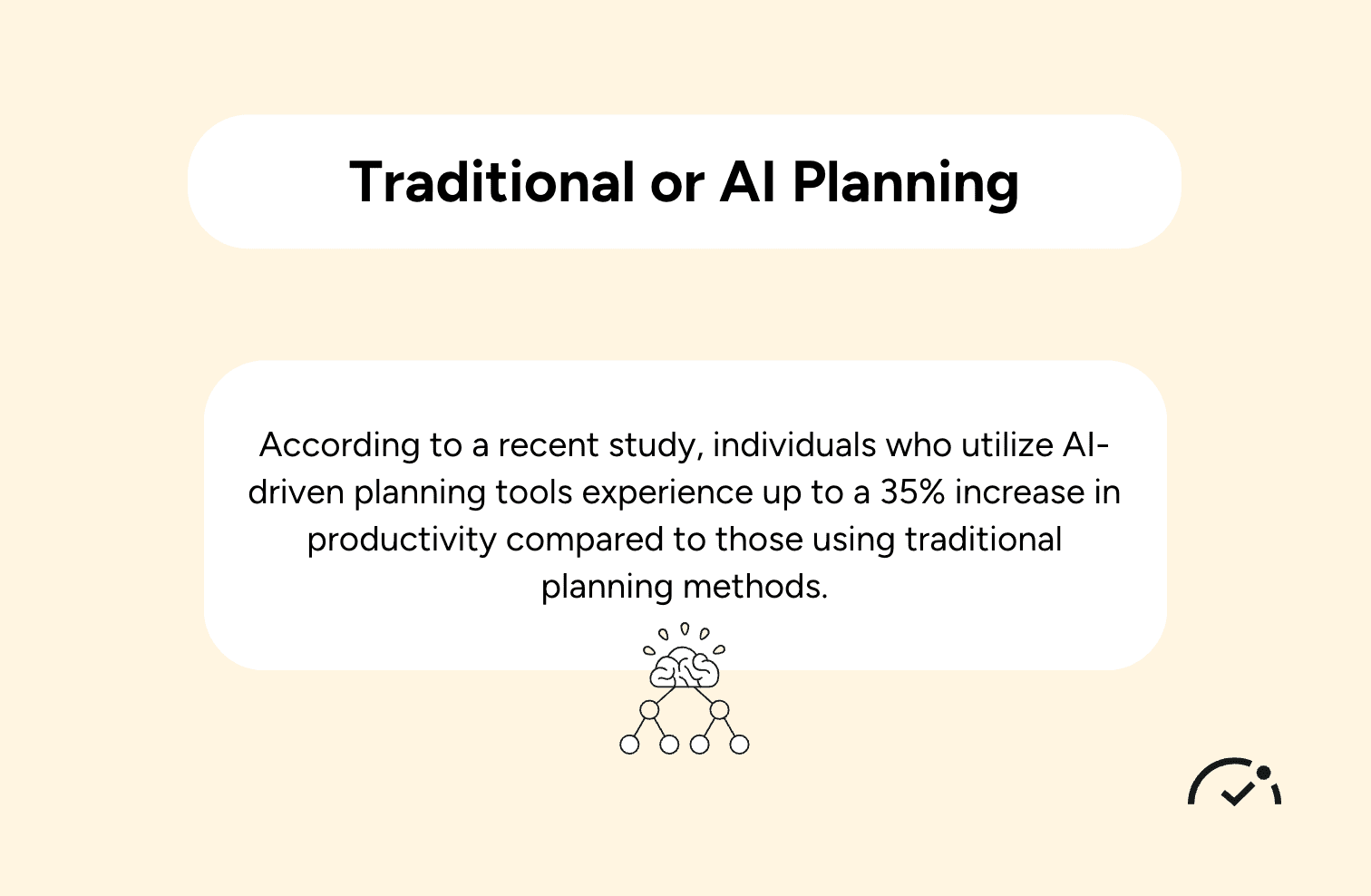
As we reveal the top software that leads the way in intelligent organization and productivity, see how AI can revolutionize planning and calendar management.
You might also like:
What is AI Planner?
In the context of artificial intelligence, an AI planner is a system or program that is intended to provide plans or action sequences to accomplish particular objectives. These planners are employed in a variety of settings where making decisions and addressing problems call for a sequence of activities or processes.
Robotics, logistics, scheduling, and other fields requiring the creation of effective and efficient plans frequently employ AI planners.
AI planners often operate by formalizing the issue domain and potential courses of action, frequently via the use of logical or mathematical models. They then comb over the universe of potential designs using algorithms and heuristics to locate one that meets the specified objectives and limitations.
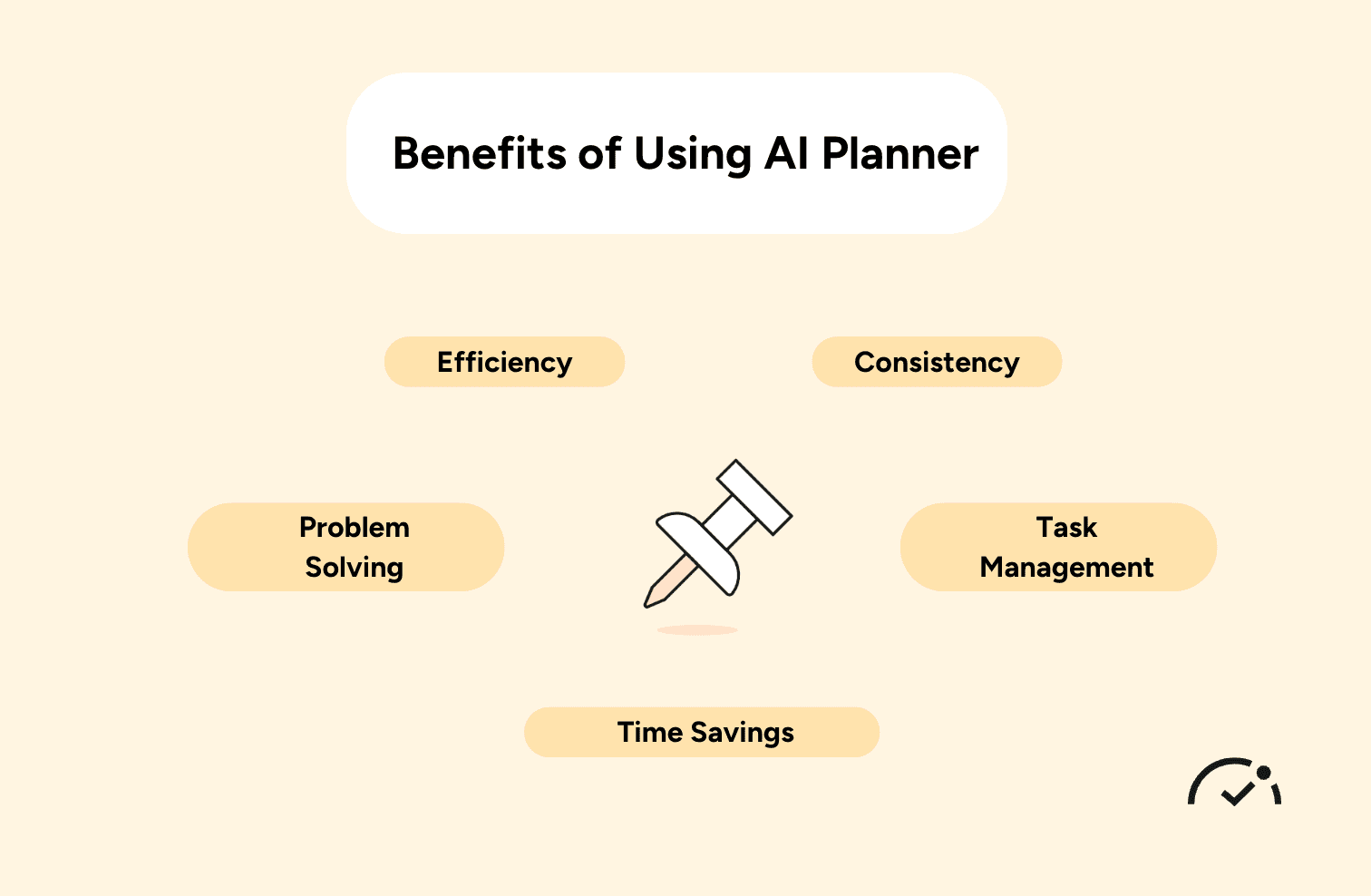
Benefits of Using AI Planner
There are several advantages to using AI planners in a variety of fields. Here are a few main benefits:
Efficiency: By automating difficult decision-making processes, AI planners may swiftly create optimal plans that improve the efficiency of systems and organizations. This is very helpful for scheduling, logistics, and resource allocation.
Complex Problem Solving: AI planners are highly skilled at managing complicated issues with plenty of moving parts and restrictions. They are able to solve problems that would be difficult or time-consuming for people to calculate.
Time Savings: AI planners may drastically cut down on the amount of time needed to create schedules or plans by automating the planning process. In time-sensitive applications like production scheduling or emergency response, this is essential.
Consistency: By applying rules and limitations consistently in a variety of settings, AI planners reduce the possibility of human mistake. This is particularly crucial in industries like manufacturing and healthcare where accuracy and consistency are essential.
10 AI Planner & Calendar Assistants in 2024
In 2024, a wide range of AI-powered planners and calendar helpers will be introduced into the ever-evolving productivity and organization scene, completely changing how people and organizations manage their time and responsibilities.
Using state-of-the-art artificial intelligence technology, these intelligent assistants offer dynamic, individualized solutions for job management, scheduling, and general productivity improvement.
This blog delves into 10 exceptional AI planners and calendar aides that have gained recognition for their cutting-edge features, smooth connection with external apps, and capacity to adjust and learn from user behavior as we enter this era of sophisticated digital planning.
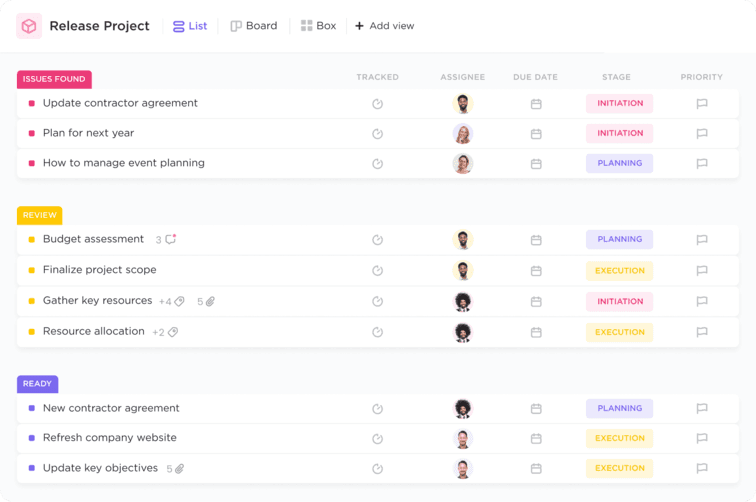
2. ClickUp
ClickUp is a well-known cloud-based platform for project management and productivity that boasts an intuitive UI and a wide range of capabilities. Its purpose is to facilitate effective task list and project organization for both people and teams, helping them manage personal life and work seamlessly. A wide range of advanced features are available with ClickUp, such as goal monitoring, time tracking, calendar events, document sharing, schedule meetings, and more.
Customizable workspaces, a task hierarchy with lists and subtasks, a variety of views (such as List, Board, Calendar, and Gantt Chart), and interfaces with other third-party apps make it an effective personal assistant. It also supports different meeting types, including urgent meetings and regular updates, allowing users to focus on the current task or a single task at hand.
ClickUp's extensive suite of collaboration capabilities and basic features makes it adaptable for a variety of businesses and project types. Users can customize their workspace to meet their own requirements, making it a versatile tool for both personal and professional use.
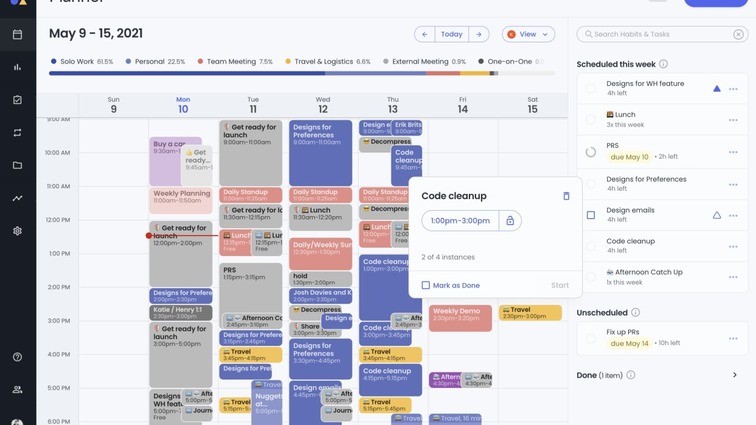
3. Reclaim
Reclaim AI is a cutting-edge project management tool that maximizes schedules and productivity by utilizing artificial intelligence. Reclaim AI uses adaptive scheduling strategies and intelligent calendar analysis to find ideal times, prioritize critical tasks, and assign work automatically, all in accordance with your preferences.
This scheduling app is excellent for implementing time-blocking methods, allowing you to manage buffer times and create the perfect schedule for both individual and team activities. Reclaim AI offers a user-friendly experience by seamlessly integrating into common calendar software, reacting to changes in your schedule, and making intelligent suggestions for task management.
Its features include the ability to prioritize activities, optimize meeting schedules, and continuously improve its scheduling skills by learning from user behavior. Whether you're working on an individual plan, a basic plan, or handling the heavy lifting for a busy team, Reclaim AI serves as a reliable scheduling assistant for those looking to improve productivity and optimize their time management procedures.

4. Clara
Known for its cutting-edge virtual assistant technology, Clara Labs is a trailblazing business that has revolutionized email correspondence and calendar app scheduling procedures. The main feature of Clara Labs' product is Clara, an intelligent virtual assistant that uses natural language processing and artificial intelligence to comprehend and reply to emails on behalf of consumers.
Clara Labs' main goal is to expedite the sometimes difficult and time-consuming task of arranging appointments and setting up client meetings and team meetings. Clara streamlines the scheduling process by connecting with users' calendars in a smooth manner, suggesting appropriate times for upcoming meetings, and minimizing the need for lengthy email exchanges.
This creative approach not only increases productivity but also learns from user interactions, helping to manage recurring tasks and individual tasks while evolving with smart features and additional features that make it even better at handling email-related tasks. Clara's powerful features lead the way in utilizing AI to improve and streamline how people and groups manage their email correspondence and day planner duties, ensuring there's always time for tasks.
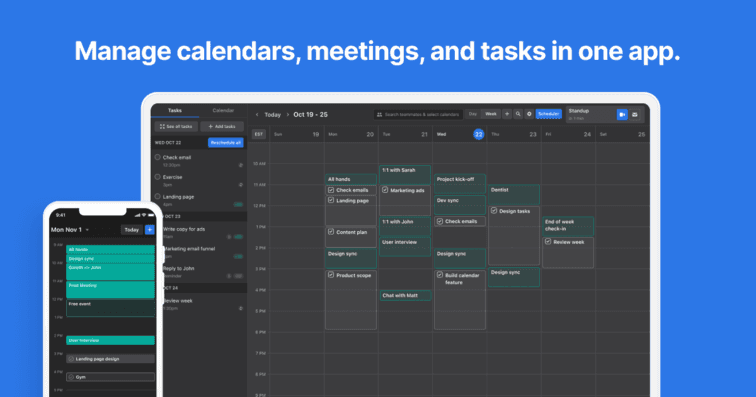
5. Motion
Motion helps you and your team schedule your days with the aid of machine learning. Allow this assistant for scheduling to use artificial intelligence to create manageable daily calendars based on the numerous meetings, responsibilities, and projects you have.
To plan follow-ups, distribute scheduling links, and join calls from any website without having to navigate in and out of your calendar, use it as a browser plugin.
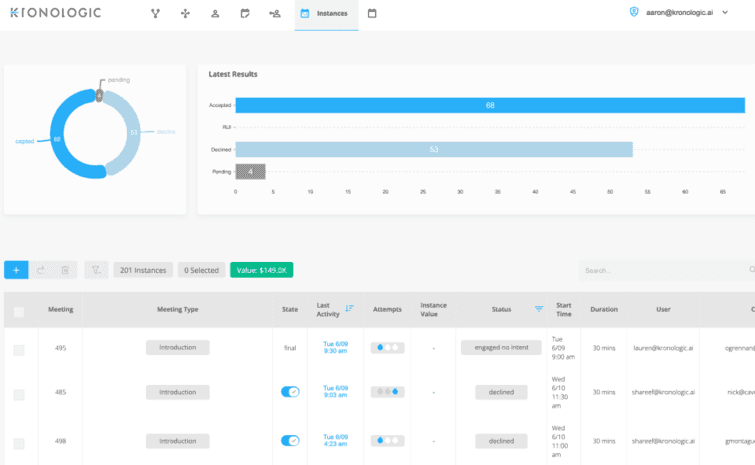
6. Kronologic
The goal of the sales automation platform Kronologic is to maximize the planning and arranging of sales meetings. In order to increase productivity and efficiency and optimize the appointment-setting process, Kronologic leverages artificial intelligence.
The software automatically schedules meetings and appointments based on user preferences and availability by integrating with calendars and communication applications. Kronologic hopes to help salespeople find the optimal moments to engage with potential customers, cut down on manual labor, and minimize schedule conflicts by utilizing AI-driven insights.
Kronologic’s features include:
Automatic scheduling: Automatically sets up meetings and appointments based on availability.
Integration with calendars and communication apps: Seamlessly connects with existing tools.
AI-driven insights: Provides intelligence for optimal timing and reduced conflicts.
Productivity enhancement: Aims to increase efficiency in the sales process.
Kronologic’s intelligent approach to sales automation ensures that sales teams can focus more on engaging with clients rather than dealing with scheduling hassles, leading to a more streamlined and effective workflow.
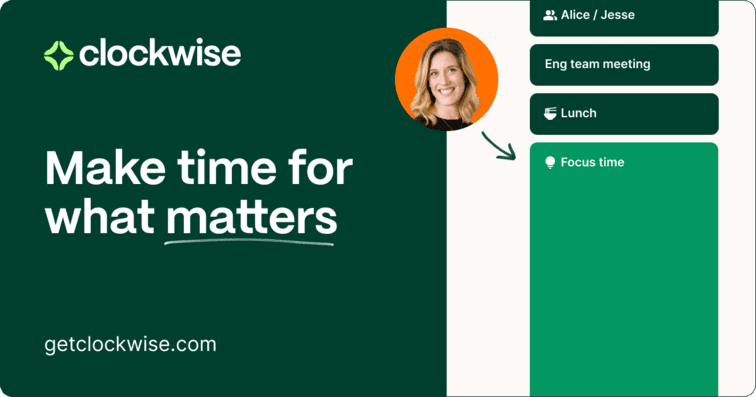
7. Clockwise
With its sophisticated calendar management and optimization features, Clockwise is a scheduling and calendar optimization solution that helps users increase productivity. The application makes use of artificial intelligence to evaluate timetables, find optimal windows for concentrated work or meetings, and automatically reschedule appointments to produce more balanced and productive calendars.
By eliminating scheduling conflicts, cutting down on fragmented time, and strategically organizing duties, Clockwise seeks to assist users in achieving a better work-life balance. Clockwise strives to enhance time management and productivity for both individuals and teams by implementing features like:
Smart Meetings: Optimizes meeting scheduling to reduce conflicts and overlap.
Focus Time: Safeguards designated work hours to ensure uninterrupted work periods.
Clockwise’s intelligent approach to calendar optimization helps users maximize their valuable time and maintain a balanced schedule, ultimately leading to improved efficiency and a healthier work-life integration.
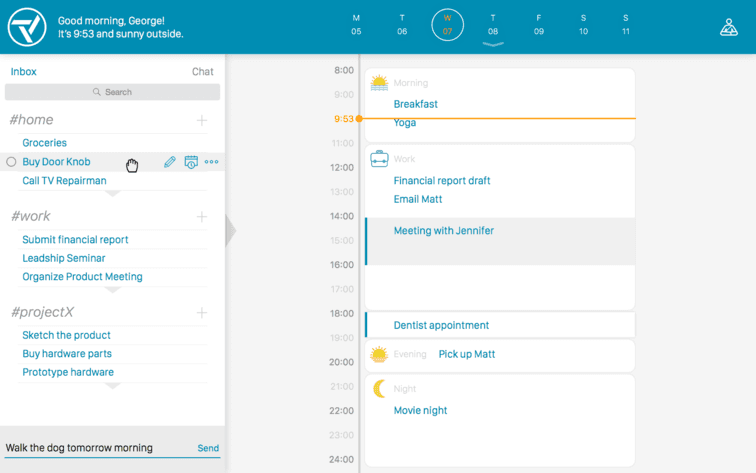
8. Trevor
Trevor is an AI planner tool that uses time-blocking strategies to improve productivity and time management. By assigning distinct time blocks to various jobs or activities, block time helps people stay focused and organized throughout the day.
With the help of the app's drag-and-drop feature, users can easily manage their appointment scheduling and schedule suggestions graphically in a dashboard. Users can see in real time everything that is vying for their attention, from action items to types of events, thanks to this visual depiction.
Trevor's smart scheduling and efficient scheduling features, combined with its focus on visual management and real-time awareness, create a powerful combination for anyone looking to create a balanced schedule. The software helps users reclaim valuable time and achieve a better work-life balance by ensuring both personal and professional responsibilities are well-managed. Additionally, Trevor can integrate with social profiles and manage the sales pipeline, offering a comprehensive solution for managing all aspects of life.
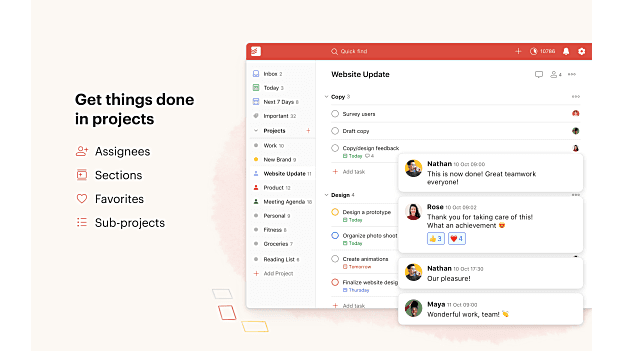
9. Todoist
With the help of the flexible and user-friendly interface of the task management tool Todoist, both individuals and teams may effectively arrange their workload. Users can create daily tasks, set deadlines, and organize them into projects using a simple interface that supports an organized approach to workplace productivity.
Todoist's features, which include labels, filters, and priority levels, enable extensive customization and organization. The task organizer app allows users to manage task dependencies and facilitate smooth teamwork by assigning tasks to team members and discussing team plans and special events. Task inbox features and reminders help users stay on top of their high-impact tasks and action plans.
With integration with several tools and cross-platform accessibility, Todoist ensures users can manage their tasks from multiple devices and keep track of upcoming appointments and deadlines. The app’s email assistant feature helps streamline communication by managing the email inbox and optimizing email content. Karma points, a gamification feature of Todoist, provide a motivating touch and complete the package for efficient and successful task management, ensuring a perfect balance in managing busy lives and a busy month.
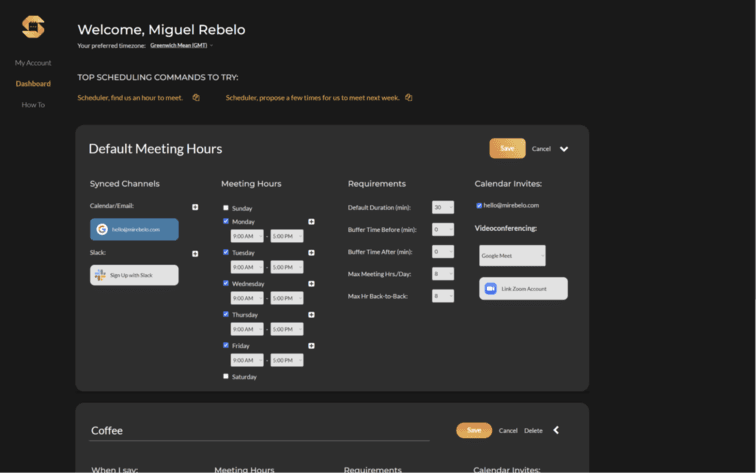
10. Scheduler AI
Scheduler AI appears to be an application designed to streamline the scheduling process by integrating directly with your emails and messages. Unlike traditional scheduling tools that heavily rely on dashboards, Scheduler AI operates within your existing communication channels, allowing users to schedule 1-on-1 or group meetings seamlessly.
A key differentiator is its ability to interpret the intent behind messages and convert that into scheduling actions. Scheduler AI offers compatibility with Gmail, Slack, website integrations, web forms, and even text messages, providing users with a versatile solution for efficient and context-aware meeting scheduling.
Scheduler AI features include:
Seamless integration with communication channels for efficient scheduling.
Ability to book demos and discovery calls quickly.
Adaptability for both individual users and sales teams.
Compatibility with Gmail, Slack, and other messaging platforms.
Context-aware scheduling based on message intent.
This versatile approach ensures that scheduling is not only streamlined but also deeply integrated into your existing workflows, enhancing productivity and reducing administrative overhead.
Which One Is Better?
When it comes to choosing the best AI Planner, several options stand out for their unique features and capabilities. BeforeSunset AI, Clockwise, Scheduler AI, and Kronologic each offer powerful tools to enhance productivity, streamline scheduling, and manage tasks more effectively.
However, among these, BeforeSunset AI emerges as the top choice for its comprehensive features and user-centric approach.
BeforeSunset AI distinguishes itself with its advanced features and AI-driven insights, making it a robust tool for anyone looking to optimize their daily planning and work-life balance. Its ability to integrate seamlessly with your existing workflows and provide real-time updates and intelligent task management sets it apart from competitors.
Here’s why BeforeSunset AI stands out:
Comprehensive planner: Offers an all-in-one solution for daily, weekly, and monthly planning.
Smart scheduling: Uses AI to optimize your calendar and reduce conflicts.
Focus time management: Ensures uninterrupted work periods with Focus Time and Smart Meetings.
Enhanced team collaboration: Facilitates real-time updates and shared progress.
BeforeSunset AI not only addresses the core challenges of time management and scheduling but also enhances your overall productivity by offering a tailored and intelligent approach to planning.
Whether you’re managing personal tasks or coordinating with a team, BeforeSunset AI proves to be the perfect planner for achieving your goals efficiently and effectively.


